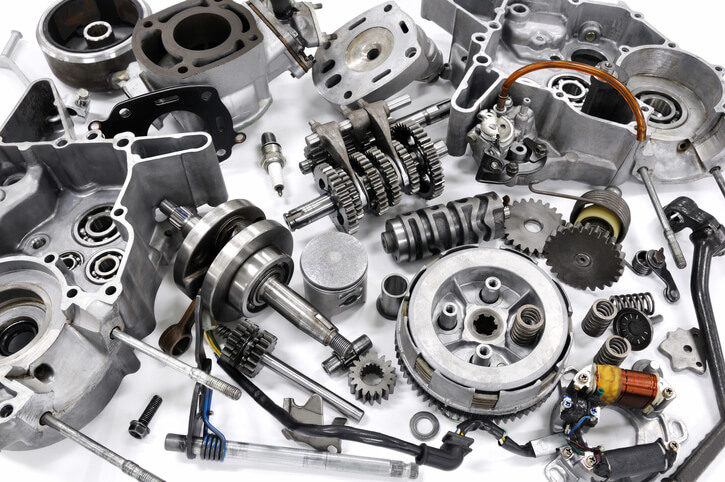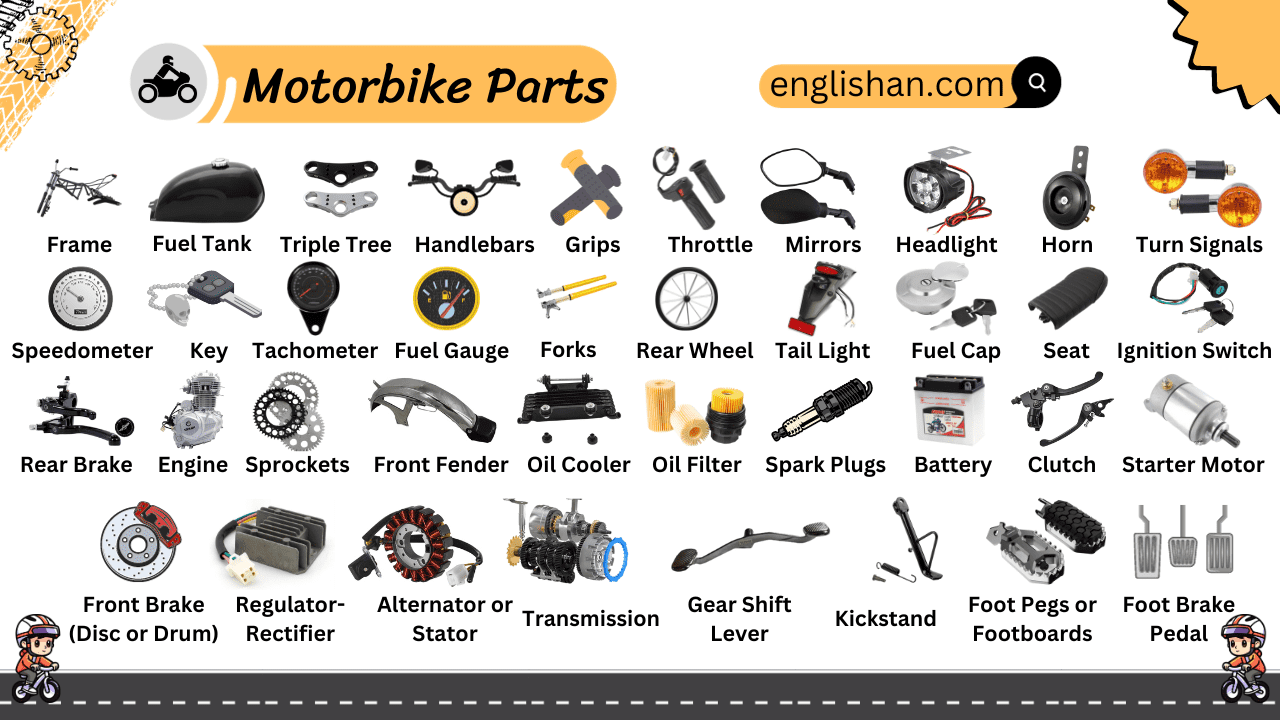Surprising Facts About Maintaining Bike Parts Wellington in Humid Climates
Discover the Crucial MotorBike Components You Required for Optimal Efficiency
Recognizing the crucial parts of a motorcycle is essential for attaining peak performance. Each component, from the engine to the braking system, plays an important role in total functionality and security. Routine upkeep can prevent unanticipated failures and improve the riding experience. Nonetheless, several bikers ignore the details of these systems. Uncovering just how they collaborate can lead to a more effective adventure. What crucial components should every biker prioritize?
The Engine: The Heart of Your Motorcycle
The engine works as the core component of a motorcycle, driving its efficiency and specifying its capacities. It is in charge of transforming gas right into power, which powers the bike ahead. Different sorts of engines are employed, including single-cylinder, V-twin, and inline arrangements, each offering distinctive features matched for various riding purposes and designs. The engine dimension, usually determined in cubic centimeters (cc), considerably influences efficiency, with larger engines usually supplying even more power and torque.Furthermore, the engine's layout and modern technology, such as gas shot systems or air-cooling versus liquid-cooling, affect efficiency and reliability. Upkeep is crucial for peak procedure; aspects like normal oil modifications and checking spark connects warranty durability. Bikers frequently consider an engine's responsiveness and level of smoothness, as these qualities improve the total riding experience. Inevitably, the engine stays a crucial element that specifies not only the motorcycle's efficiency however also the cyclist's connection to the machine.
The Transmission: Shifting Gears Efficiently
The transmission plays an important function in a motorbike's efficiency, particularly in the technicians of equipment shifting. Recognizing how to shift equipments smoothly can improve the overall riding experience, while normal maintenance warranties peak performance. Proper focus to these aspects can greatly influence the long life and effectiveness of the bike.

Equipment Shifting Mechanics
Smooth gear moving is essential for optimal motorbike efficiency, significantly influencing both acceleration and control. The mechanics of equipment shifting include the communication between the clutch, equipment bar, and transmission system. When a motorcyclist engages the clutch, it disengages the engine from the transmission, permitting for an equipment modification without damaging the elements. A well-timed launch of the clutch, combined with exact activity of the equipment lever, facilitates a seamless modification in between gears. This process ensures that the engine runs within its best power band, improving performance. Motorcycle Spares Christchurch. Furthermore, comprehending the equipment ratios and their result on speed and torque can aid motorcyclists make notified options during changes, inevitably adding to an extra responsive and delightful riding experience
Maintenance Tips Relevance
Routine maintenance plays a necessary duty in assuring that the transmission system operates successfully, enabling smooth gear changes. Regularly transforming the transmission and examining liquid is crucial, as old liquid can cause raised rubbing and wear. In addition, checking the clutch for wear assurances peak interaction and disengagement, stopping slippage during gear changes. Lubrication of relocating components is equally essential to reduce rubbing and boost performance. Motorcycle proprietors need to likewise keep an eye on for leaks and uncommon noises, as these can indicate underlying concerns. By sticking to these maintenance tips, riders can lengthen the life expectancy of their transmission system, ensuring that gear shifts continue to be seamless and adding to the general performance of their motorcycle.
The Braking System: Ensuring Safety on Every Trip
Braking systems are basic elements that directly influence a motorcycle's security and performance. They are composed of various components, consisting of brake pads, blades, calipers, and hydraulic lines, all functioning with each other to guarantee reliable deceleration. The sort of braking system-- generally either disc or drum-- influences responsiveness and stopping power.Regular upkeep is vital to copyright peak efficiency; used brake pads can cause decreased efficiency and increased quiting distances. Furthermore, the top quality of brake fluid need to be kept track of, as it can soak up moisture gradually, endangering stopping efficiency.Riders should likewise take into consideration the significance of anti-lock stopping systems (ABS), which stop wheel lockup throughout abrupt stops, improving total security. Appropriately functioning brakes are not nearly stopping; they impart self-confidence in the rider, enabling much safer navigating via various terrains. Eventually, a reliable braking system is important for appreciating every ride with assurance.
The Suspension: Enhancing Comfort and Control
A well-functioning shock absorber greatly adds to a motorcycle's general efficiency, enhancing the performance of the stopping system. The suspension plays a considerable function in taking in shocks from uneven surface areas, ensuring a smoother ride while maintaining tire contact with the roadway. This get in touch with is necessary for both stability and control, allowing riders to navigate edges with self-confidence and precision.Different sorts of suspension systems, such as telescopic forks or mono-shocks, supply differing levels of comfort and handling. Effectively tuned suspension boosts responsiveness, giving the rider with an extra linked feel to the motorcycle. Routine maintenance checks are very important to establish the suspension elements, including springtimes and dampers, are operating at their best. A reliable suspension system not only raises the riding experience but additionally adds to the longevity of various other motorbike components by reducing damage. Because of this, spending in high quality suspension is vital for any type of major motorcycle enthusiast.
The Tires: Attaching You to the Road
Tires play a crucial function in a motorcycle's performance, working as the primary web link between the road and the cyclist. Recognizing the various kinds of tires offered can greatly affect taking care of and safety and security. Furthermore, normal upkeep is crucial to guarantee peak tire performance and durability.
Tire Enters Explained
Just how do different tire types affect a motorcycle's performance? Tire types play an important role in establishing a motorbike's security, grip, and handling. Sporting activity tires, developed for high performance, offer improved traction and responsiveness on paved roadways, making them optimal for competing and hostile riding. Alternatively, touring tires focus on longevity and convenience, giving a smoother adventure for long-distance travel. Off-road tires, identified by their sturdy tread patterns, stand out in traction on unpaved surfaces, appropriate for journey fanatics. Additionally, dual-sport tires mix qualities from both on-road and off-road categories, dealing with flexible riding demands. Inevitably, picking the appropriate tire kind is necessary for maximizing efficiency, guaranteeing safety and security, and boosting the general riding experience.
Upkeep Tips Offered
While riding on the road, maintaining perfect tire condition is vital for security and performance. Routinely checking tire stress is very important, as under-inflated tires can cause bad handling and boosted wear. It is a good idea to inspect step deepness often; used tires concession grasp and security. In enhancement, motorcyclists need to try to find indicators of damages, such as lumps or splits, which can show the need for replacement. Turning tires periodically assures even wear, boosting longevity. Additionally, keeping tires tidy from debris and avoiding excessive visuals can lengthen their lifespan. Finally, keeping correct alignment and balance adds to peak performance, lessening stress on various other bike components. Following these upkeep suggestions will greatly improve the total riding experience.
The Fuel System: Fueling Efficiency and Performance
The fuel system plays a vital duty in maximizing a motorcycle's efficiency and efficiency, as it ensures the optimal distribution of fuel to the engine. It makes up several crucial elements, including the fuel tank, fuel pump, gas filter, and gas injectors or carburetor. Each part should function effectively to assure a powerful and smooth ride.The fuel tank stores gasoline and supplies it to the engine using the fuel pump, which generates i was reading this the necessary pressure. A gas filter avoids pollutants from entering the engine, while the injectors or carburetor mix fuel with air for combustion.Proper upkeep of the fuel system is critical; a stopped up filter or malfunctioning injector can lead to lowered performance and increased gas usage. By validating that the fuel system operates successfully, cyclists can appreciate better throttle reaction, much better fuel economy, and on the whole boosted riding experience.
The Electrical System: Powering Your Experience
A reliable electrical system is essential for the general performance and safety of a motorcycle, as it powers vital components such as the ignition, lights, and different electronic systems. This system includes the battery, which stores energy, and the generator, responsible for producing power while the engine runs. The electrical wiring harness links these components, guaranteeing reputable power distribution.Additionally, fuses shield the system from overloads, while relays help control high-current devices with low-power signals. A well-kept electric system boosts efficiency by making certain smooth starts and regular procedure of signals and lights, vital for cyclist visibility and safety.Regular checks of the battery's cost and connections are essential for protecting against electrical failings. Motorcyclists must additionally examine wiring for damage, making certain all parts work preferably. Ultimately, a durable electrical system adds considerably to the total efficiency and integrity of the motorcycle.
Often Asked Inquiries
How Commonly Should I Replace My Bike's Battery?
The frequency of motorcycle battery replacement depends on usage and upkeep (Oem Parts New Zealand). blog here Normally, batteries need to be replaced every three to five years. Regular checks can help recognize when a replacement is required for peak efficiency
What Tools Do I Required for Basic Motorbike Upkeep?
For fundamental motorcycle maintenance, one requires important tools such as an outlet collection, wrenches, blog screwdrivers, pliers, tire stress gauge, and a torque wrench. These devices help with effective upkeep and ensure the bike runs successfully and safely.
How Can I Boost My Bike's Aerodynamics?
To improve motorbike the rules of aerodynamics, one need to take into consideration readjusting fairings, making use of windscreen extensions, maximizing body placement, and reducing general weight. These adjustments help decrease drag, improving security and gas effectiveness during adventures.
What Are the Indications of a Failing Electric System?
Indicators of a failing electric system consist of dimming lights, trouble starting, irregular tool analyses, and blown merges. Motorbike Components NZ. Unusual scents or deterioration around battery terminals may additionally suggest underlying issues requiring immediate focus for security and efficiency

Just how Do I Choose the Right Oil for My Bike?
When picking oil for a bike, one need to take into consideration the producer's specs, viscosity rankings, and the sort of riding. In addition, standard versus artificial oil can influence performance and engine protection, influencing the choice significantly. The engine dimension, usually measured in cubic centimeters (cc), significantly influences performance, with larger engines generally supplying even more power and torque.Furthermore, the engine's style and innovation, such as fuel injection systems or air-cooling versus liquid-cooling, influence efficiency and dependability. A well-functioning suspension system considerably contributes to a motorbike's overall efficiency, matching the effectiveness of the stopping system. The gas system plays an important duty in making best use of a motorbike's efficiency and effectiveness, as it assures the ideal distribution of gas to the engine. A gas filter protects against impurities from getting in the engine, while the injectors or carburetor mix fuel with air for combustion.Proper upkeep of the fuel system is critical; a blocked filter or malfunctioning injector can lead to lowered performance and raised fuel usage. A well-maintained electrical system boosts performance by making sure smooth beginnings and consistent procedure of signals and lights, important for cyclist visibility and safety.Regular checks of the battery's fee and links are essential for protecting against electrical failures.